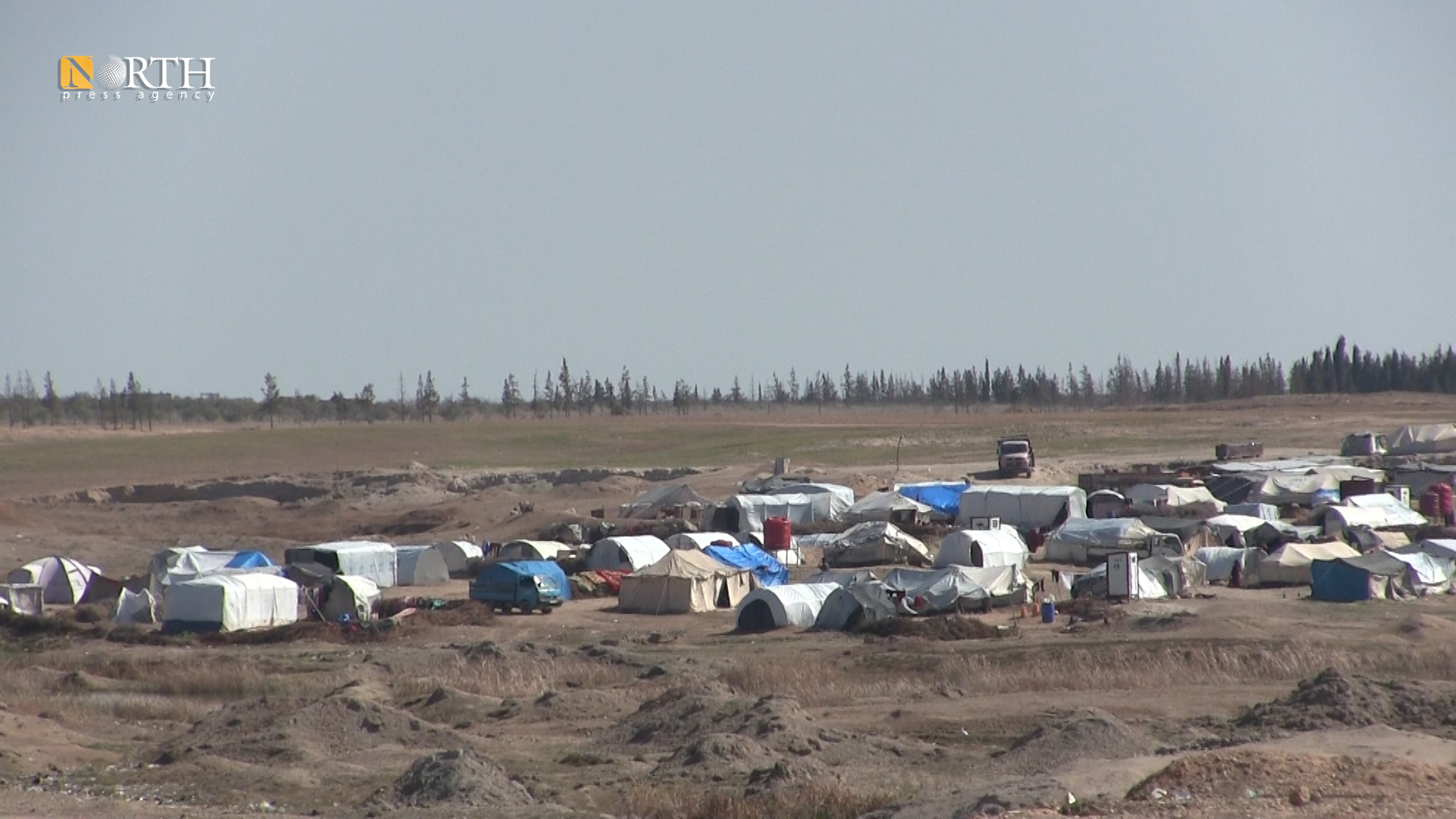RAQQA, Syria (North Press) – IDPs in the camps of the countryside of the city of Raqqa, north Syria, say that the continued collapse of the Syrian pound has increased the living conditions amid lack of aid provided by the non-governmental organizations (NGO) operating in the region.
No job opportunities
Abdulrahaman al-Ayed, an IDP from al-Mayadin in the eastern countryside of Deir ez-Zor, who resides in al-Hatash Camp, 20 km north of Raqqa, said that lack of job opportunities has worsen their situation, “we are all unemployed amid the rising prices.”
He was a blacksmith before being displaced, “I looked for a job in all industrial shops in the region but in vain,” he added.
Some of blacksmith shop owners receive him to work for one day or two for wages that do not exceed 5,000 SYP, according to him.
Al-Hatash Camp includes 150 families, where al-Hikomiya and Hazima camps, which are close to al-Hatash are considered the largest camps in Raqqa countryside, as they host more than 800 families, according to the Statistics Office of the Raqqa Civil Council.
Meanwhile, most of the residents of these camps depend on what they collect from landfills near their camps to sustain their food security.
They sell metals and use nylon to cook food.
Insufficient support
Al-Ayed finds difficulties in securing his basic supplies like vegetable oil, vegetables and meat for his family, “the prices of food have become very high and we cannot afford them, some of the materials we cannot even dream of.”
The aid provided by the NGOs such as food, bread and detergent is “insufficient and irregular,” according to IDPs in al-Hatash Camp.
Humanitarian organizations licensed by the Raqqa Civil Council like Concern, provides mall cards for most of the IDPs of al-Hatash Camp, and CHF provides bread for most for the camps.
Besides, there are local associations like al-Mawadda, which is specialized in providing food baskets, in addition to other organizations working in different sectors like providing drinking water, detergent, furniture and other things.
However, providing cards is done based on the family book which most of the IDPs missed when fleeing their homes, or those got married later could not get it due to difficulties in reaching government-held areas.
Early in January, Concern provided every family that owned a family book a card of $60, which was spent on buying food, in addition to a $120 card at the same month, according to al-Hatash camp IDPs.
Since then, the IDPs in the camp have not received aid from the organizations, they say.
high prices
The markets in Raqqa are witnessing a significant increase in the prices of materials, especially the imported ones, as a result of the collapse of the value of local currency, as one kilogram of sugar reached 2,900 SYP, a kilogram of tea reached 33,000 SYP, while a kilogram of rice is sold for 3,000 SYP, and a liter of vegetable oil for 8,500 SYP.
Mahmoud Abdulrazzaq, an IDP from the town of Sebeikhan, in the eastern countryside of Deir ez-Zor who resides in al-Hatash Camp, said, “We go to the shops and return without buying anything because of the high prices.”
Mahmoud Abdulraziq used to work as a carpenter, but he was unable to pursue his profession after his displacement due to his inability to purchase special equipment.
“I have no profession except carpentry, whose equipment was destroyed, and I can no longer buy others,” he added.
He pointed out that his children have become accustomed to not having some basic food like tea, rice and meat.
He believed that the NGOs and Raqqa Civil Council should “pay the IDPs of the camps greater attention during this period, as most of us are unemployed and do not even have the price of bread for our children.”
“The office is working on discussing projects to provide more support to the camps in northern Syria in general and to the camps in the city of Raqqa in particular, especially after the wave of high prices in the region,” head of the Organizations Office of the Social Affairs and Labor Committee of the Raqqa Civil Council, Samer al-Nashif, said.
In an audio statement to North Press, he added that most of the donors “pledged to continue support for the camps during the current year,” with promises from some parties to increase support and target the largest possible number of IDPs in Raqqa.”
There are about 62 unofficial camps in the countryside of Raqqa, most of them are concentrated in the northern countryside of the city, and are inhabited by IDPs from different Syrian cities.

